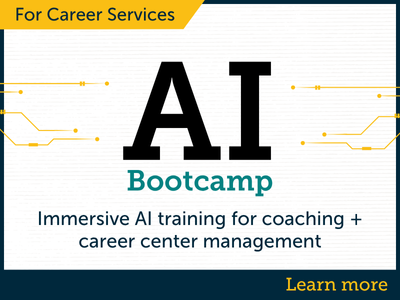For Spring Hill College, the work to attain a high knowledge rate on its first-destination survey (FDS) begins in the fall.
“I know it seems early, but it helps in the spring because if you wait until the spring to ask the question, students have not thought about their first destination and then have so much going on that is their focus, like spring break and graduation,” says Jordan Cockrell, Ed.D., Spring Hill’s executive director of career and academic success and advising.
“I ask the question in the fall so they're thinking about it when we have our first batch of career fairs and then when they go home for Christmas break. They can have those conversations early on, such as ‘I met this employer or visited with this grad school at a career fair.’ I really want them to start thinking about this early on so we can start these conversations as early as possible in the academic year.”
When Dr. Cockrell started at Spring Hill in 2021, the knowledge rate was 88%. For the Class of 2022, the knowledge rate jumped to 98%, and it currently sits at 96% for the Class of 2023.
Dr. Cockrell credits starting early and implementing a “meeting students where they are” approach for the exceptional knowledge rate. For example, one of the events career services attends to obtain FDS information from students is Spring Hill’s 100 Days celebration—a countdown of the 100 days until graduation.
“I try to be very intentional,” Dr. Cockrell says.
“At each event that we host, whether it's a career fair, career programming, or an institutionally hosted event, I reach out to students to see if they have any updates with their job hunt.”
She also reaches out electronically, acknowledging that “students in this generation don’t read emails, so if it's not a text message or a push notification, they're not going to read it.”
Dr. Cockrell amped up her efforts by visiting dorms, going to classes and involving professors, and forging personal relationships, something she says is more impactful on knowledge rates at a small college like Spring Hill. In addition, she began featuring students who have reported their outcomes on Instagram.
“Whenever I send out the FDS survey for students to complete, I include a ‘Badger Destination’ area, where students could submit a photo and provide details about where they're going and what they're doing for us to showcase them on social media,” Dr. Cockrell says.
“It has been very popular. After all, what student doesn't want to be featured on social media, where everybody can see their accomplishments? Students enjoy it and it got more students interested, because they thought, ‘My friend got shared on social media. I wanted to be shared too.’ ”
Dr. Cockrell offers other suggestions for attaining a high FDS knowledge rate:
- Listen to students—Get to know your students and what they enjoy, what they like to do, and where they hang out, then use that information to literally meet them where they are. As this information starts to flow, invest more in the technology side—emails, text messages, push notifications, and social media—to maintain contact and solicit and celebrate updates.
- Simplify the process—Streamline the number of questions—asking the bare minimum on the FDS—and make it as simple as possible to try to prevent students from being overwhelmed by the task. Then, if possible, have students answer other questions in conversations and during meetings to fill in gaps, again, something that’s much easier to do at smaller colleges.
- Understand that it’s hard to track down students after they leave campus—Once they're gone, they're gone. Hoping that new graduates keep the same phone number, check their email, or update their information on social media is very unreliable, so it's very important to try and gather as much information as possible before they walk across the stage at graduation.
“In the end, you can only do what you can do,” Dr. Cockrell says.
“Career services can put on as many events and career fairs and bring in as many employers as possible, but students will only do what they have to do. You’re going to be working down to the wire trying to collect FDS information, so start early and continue to be creative.”
Other recent articles about colleges attaining high FDS knowledge rates are available on NACEWeb.






